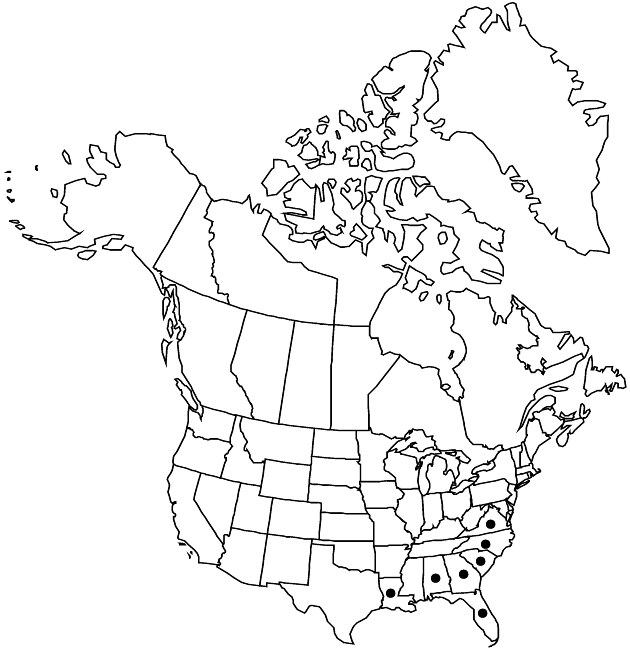Difference between revisions of "Symphyotrichum elliottii"
Phytologia 77: 280. 1995.
FNA>Volume Importer |
imported>Volume Importer |
||
| (5 intermediate revisions by 2 users not shown) | |||
| Line 8: | Line 8: | ||
}} | }} | ||
|common_names=Elliott’s aster | |common_names=Elliott’s aster | ||
| − | |basionyms={{Treatment/ID/ | + | |special_status={{Treatment/ID/Special_status |
| + | |code=E | ||
| + | |label=Endemic | ||
| + | }} | ||
| + | |basionyms={{Treatment/ID/Basionym | ||
|name=Aster elliottii | |name=Aster elliottii | ||
|authority=Torrey & A. Gray | |authority=Torrey & A. Gray | ||
| + | |rank=species | ||
| + | |publication_title=Fl. N. Amer. | ||
| + | |publication_place=2: 140. 1841 | ||
}} | }} | ||
|synonyms= | |synonyms= | ||
| Line 36: | Line 43: | ||
-->{{#Taxon: | -->{{#Taxon: | ||
name=Symphyotrichum elliottii | name=Symphyotrichum elliottii | ||
| − | |||
|authority=(Torrey & A. Gray) G. L. Nesom | |authority=(Torrey & A. Gray) G. L. Nesom | ||
|rank=species | |rank=species | ||
| Line 50: | Line 56: | ||
|publication title=Phytologia | |publication title=Phytologia | ||
|publication year=1995 | |publication year=1995 | ||
| − | |special status= | + | |special status=Endemic |
| − | |source xml=https:// | + | |source xml=https://bitbucket.org/aafc-mbb/fna-data-curation/src/2e0870ddd59836b60bcf96646a41e87ea5a5943a/coarse_grained_fna_xml/V19-20-21/V20_1165.xml |
|tribe=Asteraceae tribe Astereae | |tribe=Asteraceae tribe Astereae | ||
|genus=Symphyotrichum | |genus=Symphyotrichum | ||
Latest revision as of 19:59, 5 November 2020
Perennials, 60–160(–200) cm, colonial; long-rhizomatous. Stems 1, erect (straight, stout, sometimes purplish pink), mostly glabrous, hirsutulous in arrays, mainly in lines. Leaves firm, margins serrate to serrulate, scabridulous, apices acute to shortly acuminate, apiculate to mucronate, abaxial faces glabrous, adaxial scabridulous; basal withering by flowering, long-petiolate (petioles narrowly winged, sheathing), blades elliptic, 50–250 × 10–50 mm, bases attenuate; proximal cauline withering by flowering, long-petiolate to subpetiolate (petioles winged, bases expanded, sheathing), blades elliptic to lanceolate or oblanceolate, gradually reduced distally, 70–110 × 15–35 mm, bases attenuate; distal subpetiolate or sessile, (petioles broadly winged, bases sheathing to clasping), blades elliptic, 10–70 × 1–30 mm, progressively reduced distally, more strongly so on branches, bases attenuate to cuneate, clasping, margins serrulate or entire. Heads in paniculiform arrays, branches strongly ascending, leafy. Peduncles 0.5–2.5 cm, to erect, hirsute, bracts 3–5, linear, grading into phyllaries. Involucres narrowly campanulate, 8–11 mm. Phyllaries in 5–6 series, linear-lanceolate or -oblanceolate to linear, slightly unequal, bases indurate 1/3–1/2, margins narrowly scarious, hyaline, sparsely and remotely ciliolate, green zones lanceolate to linear, outer distally foliaceous, sometimes constricted in middle, apices spreading to squarrose, long-acuminate, apiculate, faces glabrous. Ray florets (25–)30–46+; corollas pink or sometimes lavender, laminae 7–14 × 0.8–1.6 mm. Disc florets 25–35+; corollas pale yellow becoming pink and later brown, 6–6.2 mm, tubes slightly shorter than narrowly funnelform limbs, lobes narrowly triangular to lanceolate, 0.8–1 mm. Cypselae tan to pale brown, oblanceoloid, compressed, 2–2.7 mm, 3–4-nerved, faces glabrous or sparsely hairy; pappi sordid or whitish, 5.5–5.8 mm. 2n = 16.
Phenology: Flowering Aug–Oct.
Habitat: Moist, low sites, swamps, bogs, marshes, brackish marshes
Elevation: 0–50+ m
Distribution

Ala., Fla., Ga., La., N.C., S.C., Va.
Discussion
Symphyotrichum elliottii grows on the Atlantic coastal plain. It is of conservation concern in some states.
Selected References
None.